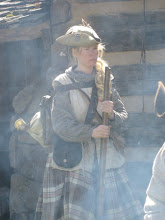

March 10. Having returned but hours ago from a brief scouting, I find myself miserably winded, and terribly unfit for the duties necessary for my position. Having gently wintered amongst friends with nearly every possible comfort it is quite disheartening to find oneself in such soft condition.
Indeed, even carrying the barest essentials; my rifle, ax, bedroll, a meager amount of foodstuffs and a small pot with which to cook, has taxed my body and left soreness within my arms and legs. I feel compelled to set out each evening with these few belongings upon my back to prepare, Prepare! for the coming season.
One must be prepared in physique, mind, and spirit for one knows not from whence troubles may arise. I'll relate a bit of a story of a scout named Lynn who encountered resistance in an unexpected manner. This narrative comes by way of a good gentleman, Mr. Dale Payne, who compiled many Narratives of Pioneer Life and Border Warfare;
"In order to make discoveries, on the 26th of September (1777), Capt. Foreman with forty-five men set out for Grave Greek. Having arrived there, and seeing the fort standing and discovering no signs of the Indians, they returned. On arriving at the foot of the narrows, a contention arose between Capt. Foreman and a man by the name of Lynn, who had been sent with him as a spy (scout) upon which road they should take, the river or ridge. Lynn urged the probability of the Indians having been on the opposite shore, and had more than likely seen them pass down; and the most likely place for waylaying them was in the narrows, and therefore urged the necessity of going the ridge road.
Foreman being indisposed to take the council of Lynn, proceeded along the base of the hill. During the contention, Robin Harkness set upon a log, having very sore eyes at the time, and took no part in the dispute; but when Capt. Foreman started, he followed him. Lynn, however with seven or eight other frontiersmen, went the ridge road. Whilst passing along a narrow bottom at the head of the narrows, the foremost of Capt. foreman's men picked up some Indian trinkets, which immediately excited a suspicion that Indians were near, which caused a halt. Before them some five or six Indians stepped into the path behind them about the same number, and at the same moment a fire was poured in upon them from a line of Indians under cover of the river bank, and not over fifteen steps from the white men. Those that escaped the first fire fled up the hill, but it being steep and difficult to climb they were exposed for some time to the fire of the Indians. Lynn and his comrades, hearing the fire when they were below them on the ridge ran along until opposite. They then proceeded to the brink of the hill, where they saw a man ascending near them, who had got nearly to the top when he received a shot in his thigh, which broke it. Lynn and his comrades rand down and lifted him up, carried him over the hill and hid him under a cleft of rocks, and then proceeded to wheeling.As Robin Harkness was climbing the hill near the top and pulling himself up by a bush, a ball struck it and knocked the bark off against him, which alarmed him, as he supposed it to be the ball, he however proceeded on and escaped unhurt. In this fatal ambuscade twenty-one of Capt. Foreman's party were killed and several much wounded; among the slain were capt. foreman and his two sons."
You see dear reader, the folly of hiring a man to fill a position and then discounting that man's words. This grievous error indisposed Capt. Foreman in a most permanent manner. Had but Lynn's word been taken for their worth, the captain his two sons and twenty one mother's sons would be well and breathing for another fight!




